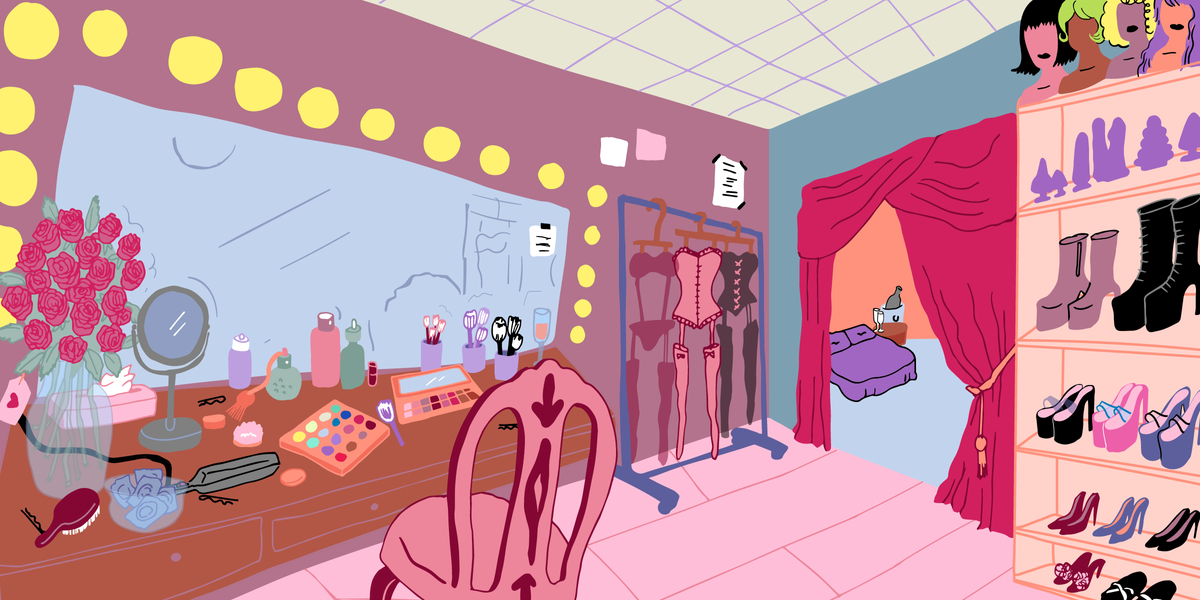
Published on 8th of February 2023
Lees dit artikel in het Nederlands
Sex work and feminism: even for feminist sex workers it’s not always clear how these two terms relate to one another. Noor Wildeling searches for depth and meaning so it may be of use to us all.
Baggy clothes hide my already small breasts and the hood of my sweatshirt covers my makeup-free face. Would you spot me on the streets on my way to work, you might not even see that I’m a woman. But take a look at me half an hour later and you would hardly recognize me. In high heels, a sexy lingerie body and a lace kimono I’m awaiting my first client. I smile sweetly, my lips are bright red, and my curls are pinned up.
Imagine two feminists looking on, from the time that my client enters until he steps outside, as if they were audience to a theater play. Afterwards we ask them what they saw. One of them says repression and exploitation, the other one claims they saw empowerment and strength. A stark contrast despite watching exactly the same play!
This is what happens in the feminist sex work debate: people speak about the same phenomenon, but the points of view diverge completely. How is that possible? Even for me, as an active performer in this theater piece, it can be confusing. If I’m so subservient to the pleasure of my client, am I not conforming to a heterosexual norm that I don’t exactly agree with outside the scope of my work? By reflecting on my own experience I would like to explore these questions with the hope that this will also provide tools to colleagues who feel caught up in the feminist debate.
Let’s start with a little glimpse into my sex life: outside of work it rarely ever happens that I’m waiting at the bedroom door of my lovers in a smashing bodysuit, high heels, and a lace peignoir. To each their own, but it’s just not my thing. Still, I can enjoy it thoroughly at work. At the brothel I can experiment with femininity: a space and at the same time a stage where I can play with expectations and stereotypes. One could view it as drag, a type of parody on feminine seduction. I exaggerate, just like classic drag selects and exaggerates certain feminine characteristics. This is not only about my own performance, but also about the dynamic between me and my co-star, the client: we’re role-playing a classic form of heterosexuality, in which I, as a woman, grant him the favor he’s asking for. My acting is over the top, but not too much, my client still needs to be able to suspend his disbelief to stay within the illusion.
Parody plays an important role in Judith Butler’s queer theory: drag showcases that our ideas about gender are cultural constructs. Drag shows us that the attributes we associate with one gender may just as well apply to the opposite gender. In this way, drag is resistance against prevailing gender roles. At the same time, parody can also contribute to the affirmation of certain dominant gender roles. So how do we tell the difference? How can an audience determine which interpretation of the theater play is the right one? According to Butler this is indeed difficult, which makes parody risky. Sometimes it remains unclear and unstable, and is it impossible to give a definitive interpretation. That may be a difficult position in the context of public discourse, where clarity is highly valued. But this instability is no reason to disregard parody. The whole point is to keep playing and experimenting. Because if there is room for play, there is movement.
For me personally, playing with femininity at work definitely set a lot in motion. When I first started out with sex work, I began to enjoy showing my ‘masculine’ side in my private life much more. And importantly: I became less subservient towards men. I smiled at them less, gave them less attention when they were angling for it in streets or in bars.
By playing classic heterosexual games at work, I manage to escape them more and more in my daily life. This is my personal experience of course; sex work is much broader and more diverse than what I know, and other forms of sex work bring different experiences. This is why I think it’s important that we as sex workers express our experiences and share them with one another. Because how can we tell our confused theater audience what they just saw, if not by speaking for ourselves?
When I step outside after my workday, I am no longer in drag. Sometimes I dress more masculine, sometimes more feminine. Just what I feel like. But whatever game I feel like playing, at least I have enough money to lead my own independent life and get to smile at whomever pleases me.

